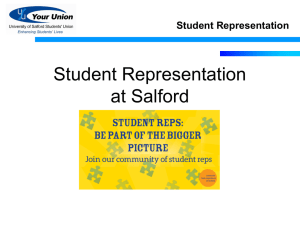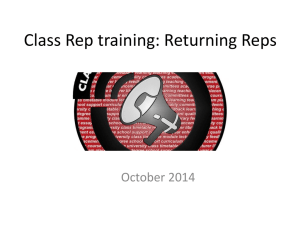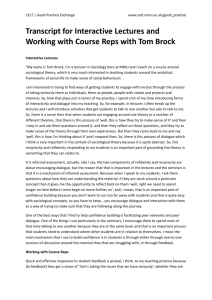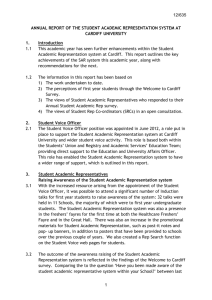UPSU Course Representative Training Handbook
advertisement
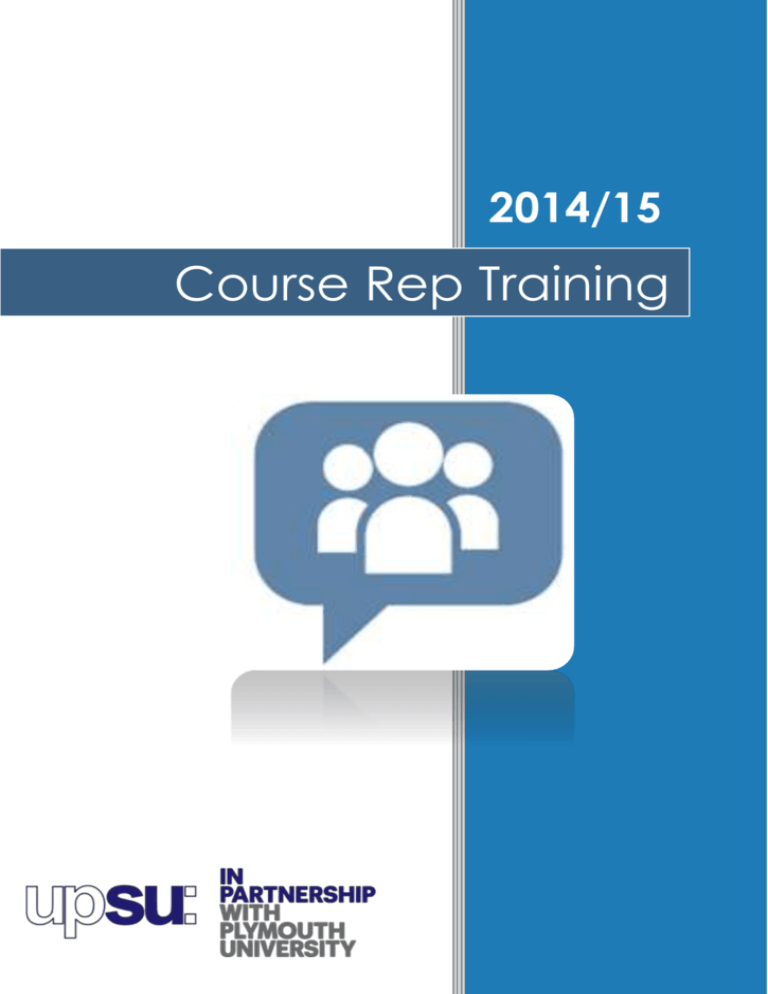
2014/15 Course Rep Training Welcome! Congratulations on becoming your course representative! You are part of an approximately 30,000 strong student body across the whole of the South West Peninsula, spanning five counties and the Channel Islands. Bicton College Bridgwater College City College Plymouth City of Bristol College Cornwall College Deep Blue Sound Exeter College Highlands College PETROC South Devon College Somerset College By reading this training booklet you will be able to: 1. Identify the key requirements of your roles as Course Reps. 2. Understand the structure of UPSU and how you fit into it. 3. Confidently approach your peers and start representing their view and voice. Strode College Tor Bridge High Truro & Penwith College Weymouth College The Following areas will be covered in this training: Students as Partners // UPSU Structure // Meetings // Feedback // Challenges // Resources & Rewards // After Today Students As Partners ‘Students as Partners’ is a term you will often hear used during your time at University, but what does it actually mean? Treating students as Partners is, in essence, a more sophisticated way of engaging with the student population. By making the student body an integral part of the decision making processes, academic representation and teaching boards, higher institutions boards, higher education institutions are ensuring g that students are education maintaining a constant are ensuring that students are presence with decision makers and authority figures. maintaining a constant presence with On a practical day to day level this means three things; decision makers. 1. YOUR voice is important, 2. YOUR voice is listened too, 3. USE it! What does ‘Representative’ mean? • R – Represent EVERYONE on your course! • E – Enable discussions and seek students views on their learning experience • P – Present students views at meetings, forums etc • R – Reflect on your own and other students experiences • E – Establish a partnership approach with PU, upsu and students • S – Share your experiences with other Course Reps and with upsu • E – Evaluate the positive difference you have made over the year • N – Notify students, upsu and PU of on-going developments (feedback) • T – Take time to celebrate your hard work and success! Students As Partners Your Role as a Course Rep – Why you are important To represent the views of students on your course to your lecturers & programme leaders. AIM: to make changes to benefit students on your course. To raise issues with other course reps and the student union, so common issues can be raised at a higher level. AIM: to improve institution-wide procedures to the benefit all students, and to share ideas and suggestions with other course reps. To facilitate communication between the student body and your college, the University, and the Students’ Union. AIM: to act as a representative and provide a flow of communication, about both academic issues and other opportunities and events As shown on the earlier map, the partner college network is very wide, so to help communication between UPSU, Plymouth University, and you students, Course Reps fulfil a valuable role in the communication process. Course reps are fundamental to providing this student voice! Your Tasks as a Course Rep You will be required to carry out a variety of tasks and attend a number of meetings in your role. Some of these may include but are not exclusive to; Attend Course Rep Training Attend various meetings as required Publicise yourself and what you can do for your fellow students Feedback the outcomes and actions from meetings Complete any actions from meetings Publicise campaigns and opportunities from UPSU Sign-post students to UPSU / College / University Services. Gather students views and gauge if they need to be raised at programme committee / rep forum meetings UPSU Structure UPSU Exec. VP Outreach Outreach Officer You are part of a wellestablished structure designed to help, guide and support you in your role as a course rep. College Reps Each College will elect a College Rep to provide a representative at higher strategic meetings. Course Reps Student Body Are you up for the job, could this be you? Who attends what meetings? There are a number of different meetings that you will attend and feed into. They are: Student Representative Representing Meetings Attended UPSU President All Plymouth University Students University Board of Governors VP Engagement All Off Campus Students Faculty Board College Rep All HE Students at your college Partner Institution Forum College Rep (or a few course reps) All HE Students at your college College Joint Board of Studies Course Representatives Representing students from your group (possibly including the views from other years, part time students) Cross-College Student Rep Forums Course Representatives Representing the views of your specific class or group Programme Committee & Course Rep Meetings Meetings Accurate How to Represent at Meetings For each issue or topic raised, try to apply the ‘ABCD’ of representation... Balanced Depersonalised Issues which fit into the ‘middle’ of the diagram tend to achieve the most positive outcomes. Constructive Accurate - Get the facts, know the full story, try and be as accurate as you can (dates / times / frequency of problem etc.) Balanced - Does this issue affect the whole group? Are there two sides to the story? Constructive - Come up with some suggestions for resolution. Share ideas and problems with other student reps on other courses, there may be some suggestions for improvement. Depersonalised - Don’t name names or point fingers. Don’t criticise individual lecturing staff. If an issue only affects one student, then maybe it’s a personal problem and that student needs to find separate help. Three Stages to Meeting Preparation Before meetings • • • • Be prepared Research Gather & record the student views Go through the ‘ABCD of representation Read Agenda – notes any points of interest During meetings • • • • • • • Arrive ready Be polite Speak clearly Represent the views of your group Listen & make notes of what’s been said Don’t interrupt others Be Confident After meetings • • • Share feedback on your points raised Follow up anything you have agreed to Share best practice across the network Feedback Why is Feedback Important? Gather Student Views Feedback is crucial for many reasons but the most important is to ensure that everyone knows what is going on! There are two types of feedback you need to use most often; feedback to UPSU & your college on the views of your course group, and feedback to your course group on the outcomes of meetings and updates from your college & UPSU. You are the centre pin for all this communication, never underestimate the power and importance of the student voice! Share Student Views Inform Students Action Views Ways of feeding back There are many different methods of feedback, all with pros and cons. The best thing to do would be to ask your course how they would like to receive updates and share their views. To start off here are some ideas: • • • • • • Create a course Facebook page – send out updates/ messages, Use Survey Monkey to collate views – especially good for large groups or part time courses, Write a brief report, Send around group emails to your class – be mindful that not all students use their college email accounts, Ask your lecturer for some time at the end of a lecture to present findings – There can be time restrictions with this. Use existing college media outlets to communicate updates etc – Not all information may be relevant for all students. Remember – There is no correct answer – use the best method for your course! Challenges Understand the boundaries of your role Sometimes students may have incredibly emotional or personal issues that they turn to you with. No matter how prepared you may feel to deal with such issues - DON’T! It is not in the best interests of yourself or the student for you to do this. There are professional advice services that are in place to support on these issues, it will be in your benefit to take some time to learn about the support services on offer at your college and at UPSU so you are able to sign post any students. Student Issues Your Issues Personal emotional problems Time Management Financial problems Confidence Building Accommodation problems Gaining input from your course Visa / Immigration problems Understanding jargon and acronyms As well as issues that students may bring to you, it is also important to remember problems that you may face. Additional training sessions can always be made available to help overcome these. Speak to your college or UPSU for more details. Anonymity & Confidentiality Remember: • You should not refer to students by name • Assure students that matters are kept anonymous • If a student comes to you with a personal issue you must keep this confidential (& you should refer them to SU advice or your college advice service). • Remember, as a course rep you are trusted to be responsible with information. Resources & Rewards Know the support out there studywithplymouth.ac.uk This will become an essential guide and source of support throughout your studies with over 2,000,000 resources to help with every area of your academics. UPSU: Advice UPSU: Advice offer a drop in, email and telephone support service for all aspects of student life. You can contact them on a number of issues including: Academic appeals, Consumer help, Debt Advice, Housing Issues, Legal Problems and Student Finance. Contact on: 0800 953 0155 or 01752 588373 or email advice@su.plymouth.ac.uk Rewarding your hard work • Student Voice Recognition Scheme– Use your log book to record the meetings and events you attend. Submit a copy of your log book to UPSU to receive your course rep certificate. There are three levels of certificate to work towards... Bronze, Silver, Gold with corresponding rewards! For more information speak to your Outreach Coordinator at UPSU. • SSTAR Award – The Student & Staff Teaching and Representation Awards take place in April each year. There is a Course Representative Award, designed to say a massive thanks just to you and acknowledge your hard work. Look out for the opportunity to nominate fellow course reps, or teaching staff from your programme. National Student Survey (NSS) & Student Perception Questionnaire (SPQ) Both the NSS and SPQ surveys are essential sources of information for both academics and support staff. All 1 year students will have to complete the SPQ and all 2nd years the NSS. A big part of your role will be to promote these surveys in the spring term. After Today Key Contacts Cat Tetreault, Outreach Coordinator, partnershipstudents@upsu.com Will Holmes VP International & Outreach Executive Officer william.holmes@upsu.com Remember • • • • • Read and use your Course Rep Handbook Join the Course Rep Facebook Page Find out when the first Course Rep Meeting is. Don’t just wait for ‘big meetings’... start making the most of your role... communicate with fellow students, speak to college staff, gather feedback, and participate in college life. Keep in touch, & contact us if you have any questions or would like additional training. Notes
